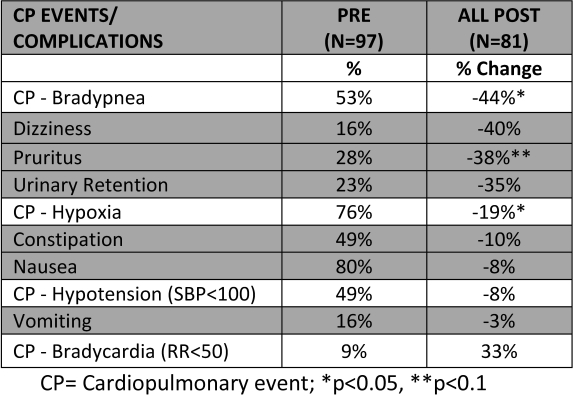Opioid-Sparing Pain Management Improves Outcomes and Safety in Living Liver Donors.
D. Ladner,1 E. Pomfret,2 M. Simpson,2 J. Guarrera,3 R. Fisher,4 A. Skaro,1 T. Baker,1 T. Curtis,1 A. Daud,1 B. Platt,1 R. Kang,1 N. Salehitezangi,1 J. Holl,1 M. Abecassis,1 D. Woods.1
1Northwestern University, Chicago, IL
2Lahey Clinic, Burlington, MA
3Columbia University, New York, NY
4Virginia Commonwealth Univeristy, Richmond, VA.
Meeting: 2016 American Transplant Congress
Abstract number: A205
Keywords: Liver transplantation, Living-related liver donors, Outcome, Pain
Session Information
Session Name: Poster Session A: Living Donor Liver Transplantation
Session Type: Poster Session
Date: Saturday, June 11, 2016
Session Time: 5:30pm-7:30pm
 Presentation Time: 5:30pm-7:30pm
Presentation Time: 5:30pm-7:30pm
Location: Halls C&D
BACKGROUND: As part of the ancillary four center study, to the Adult-to-Adult Living Donor Liver Transplant Cohort Study (A2ALL), over 75% of living liver donors were found to experience cardiopulmonary events. Consequently, a multi-center, multi-disciplinary group of experts (anesthesia, transplant surgery, pain and safety experts) developed a multimodal opioid-sparing postoperative donor pain protocol to examine the effect on patient and safety outcomes.
METHOD: Patient safety outcomes were examined pre- and post-implementation of the opioid-sparing pain protocol at four A2ALL centers. Data were abstracted from the medical records and root cause analysis of every cardiopulmonary event and complication was performed. Baseline data (PRE) 2/08-7/10 (29 months) were compared to donors receiving the pain protocol (POST) 3/13-5/15 (27 months). Findings were validated by an external monitor.
RESULTS: 97 PRE donors were compared to 81 POST donors who received the opioid-sparing pain protocol. Transient events of bradypnea and hypoxia events were significantly reduced (p<0.05). Opioid related complications all reduced with the opioid sparing protocol: nausea (-44%), dizziness (-40%), pruritus (-38%), urinary retention (-35%), constipation (-10%), nausea (-8%), vomiting (-3%)  . Pain scores were similar PRE and POST.
. Pain scores were similar PRE and POST.
CONCLUSIONS: Opioid-sparing donor pain management significantly reduced the high rate of opioid-related cardiopulmonary events and complications. Poor pain scores irrespective of opioid utilization indicate that innovations in pain protocol design are necessary to improve pain following living liver donation.
CITATION INFORMATION: Ladner D, Pomfret E, Simpson M, Guarrera J, Fisher R, Skaro A, Baker T, Curtis T, Daud A, Platt B, Kang R, Salehitezangi N, Holl J, Abecassis M, Woods D. Opioid-Sparing Pain Management Improves Outcomes and Safety in Living Liver Donors. Am J Transplant. 2016;16 (suppl 3).
To cite this abstract in AMA style:
Ladner D, Pomfret E, Simpson M, Guarrera J, Fisher R, Skaro A, Baker T, Curtis T, Daud A, Platt B, Kang R, Salehitezangi N, Holl J, Abecassis M, Woods D. Opioid-Sparing Pain Management Improves Outcomes and Safety in Living Liver Donors. [abstract]. Am J Transplant. 2016; 16 (suppl 3). https://atcmeetingabstracts.com/abstract/opioid-sparing-pain-management-improves-outcomes-and-safety-in-living-liver-donors/. Accessed July 5, 2025.« Back to 2016 American Transplant Congress
